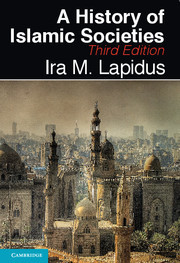A History of Islamic Societies (3rd Ed.)
Langue : Anglais
Auteur : Lapidus Ira M.

Ira Lapidus' history explores the beginnings and transformations of Islamic civilizations in the Middle East and details Islam's worldwide diffusion.
This new edition of one of the most widely used course books on Islamic civilizations around the world has been substantially revised to incorporate the new scholarship and insights of the last twenty-five years. Ira Lapidus' history explores the beginnings and transformations of Islamic civilizations in the Middle East and details Islam's worldwide diffusion. The history is divided into four parts. Part I is a comprehensive account of pre-Islamic late antiquity; the beginnings of Islam; the early Islamic empires; and Islamic religious, artistic, legal and intellectual cultures. Part II deals with the construction in the Middle East of Islamic religious communities and states to the fifteenth century. Part III includes the history to the nineteenth century of Islamic North Africa and Spain; the Ottoman, Safavid and Mughal empires; and other Islamic societies in Asia and Africa. Part IV accounts for the impact of European commercial and imperial domination on Islamic societies and traces the development of the modern national state system and the simultaneous Islamic revival from the early nineteenth century to the present.
Introduction to Islamic societies; Part I. The Beginnings of Islamic Civilizations: 1. Middle Eastern societies before Islam; 2. Historians and the sources; 3. Arabia; 4. Muhammad: preaching, community, and state formation; 5. Introduction to the Arab-Muslim empires; 6. The Arab-Muslim conquests and the socioeconomic bases of empire; 7. Regional developments: economic and social change; 8. The Caliphate to 750; 9. The 'Abbasid Empire; 10. Decline and fall of the 'Abbasid Empire; 11. Introduction: religion and identity; 12. The ideology of imperial Islam; 13. The 'Abbasids: Caliphs and emperors; 14. Introduction; 15. Sunni Islam; 16. Shi'i Islam; 17. Muslim urban societies to the tenth century; 18. The non-Muslim minorities; 19. Continuity and change in the historic cultures of the Middle East; Part II. From Islamic Community to Islamic Society: 20. The Post- 'Abbasid Middle Eastern state system; 21. Muslim communities and Middle Eastern societies: 1000–1500 CE; 22. The collective ideal; 23. The personal ethic; 24. Conclusion: Middle Eastern Islamic patterns; Part III. The Global Expansion of Islam from the Seventh to the Nineteenth Century: 25. Introduction: Islamic institutions; 26. Islamic North Africa to the thirteenth century; 27. Spanish-Islamic civilization; 28. Tunisia, Algeria, and Morocco from the thirteenth to the nineteenth centuries; 29. States and Islam: North African variations; 30. Introduction: empires and societies; 31. The Turkish migrations and the Ottoman Empire; 32. The postclassical Ottoman Empire: decentralization, commercialization, and incorporation; 33. The Arab provinces under Ottoman rule; 34. The Safavid Empire; 35. The Indian subcontinent: the Delhi Sultanates and the Mughal Empire; 36. Islamic empires compared; 37. Inner Asia from the Mongol conquests to the nineteenth century; 38. Islamic societies in Southeast Asia; 39. The African context: Islam, slavery, and colonialism; 40. Islam in Sudanic, Savannah, and forest West Africa; 41. The West African Jihads; 42. Islam in East Africa and the European colonial empires; 43. The varieties of Islamic societies; 44. The global context; Part IV. The Modern Transformation: 45. Introduction: imperialism, modernity, and the transformation of Muslim societies; 46. The dissolution of the Ottoman empire and the modernization of Turkey; 47. Iran: state and religion in the modern era; 48. Egypt: secularism and Islamic modernity; 49. The Arab east: Arabism, military states, and Islam; 50. The Arabian peninsula; 51. North Africa in the nineteenth and twentieth centuries; 52. Women in the Middle East: 19th–21st centuries; 53. Muslims in Russia, the Caucasus, Inner Asia, and China; 54. The Indian subcontinent: India, Pakistan, Afghanistan, and Bangladesh; 55. Islam in Southeast Asia: Indonesia, Malaysia, and the Philippines; 56. Islam in West Africa; 57. Islam in East Africa; 58. Universal Islam and African diversity; 59. Muslims in Europe and America; Conclusion: secularized Islam and Islamic revival.
Ira M. Lapidus is Professor Emeritus of History at the University of California, Berkeley. Throughout his long and illustrious career he has published extensively. His abiding interest has been the relationships among families, tribes, religious communities, cities and states. This is exemplified in his current work and previous publications, including Muslim Cities in the Later Middle Ages (1967, 1984), Middle Eastern Cities (edited, 1969), Contemporary Islamic Movements in Historical Perspective (1983), Islam, Politics and Social Movements, co-edited with Edmund Burke (1988), A History of Islamic Societies (1988, 2002), and Islamic Societies to the Nineteenth Century: A Global History (2012).
Date de parution : 10-2014
Ouvrage de 1017 p.
17.7x25.4 cm
Thème d’A History of Islamic Societies :
© 2024 LAVOISIER S.A.S.



